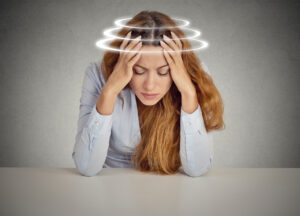3 Causes of Dizziness After an Auto Injury
Three Causes Of Dizziness After An Auto Injury

It is common for victims to associate headache or neck pain after an auto injury, yet one symptom many do not is that of dizziness. Research demonstrates that anywhere from 20-58% of those who have sustained an auto injury will experience symptoms of dizziness.
Diagnosing the source of dizziness after an auto injury can be challenging, but knowing the most common causes helps. Typically, the dizziness is caused by one of three issues.
Injury To Neck Joints
This is probably the most common cause of dizziness after an auto injury. Most of the vertebra (spinal bones) are connected to each other by the disc in front and two small joints in back called facet joints. Each of these joints are surrounded by a fibrous capsule that has a lot of small nerve endings.
In an auto injury, the force of the impact can cause a rapid stretching of this capsule and damage to the joint itself. This results in an irritation of the nerve fibers which then begin to bombard the brain with millions of rapid, random messages that result in dizziness.
Concussion
A concussion is when there has been some type of force or blow that injures the brain. Concussions can result from an auto injury either by striking the head, such as against the door or steering wheel or it can happen when the head is jerked so rapidly it literally shakes the brain inside the skull.
One of the classic signs of a concussion can be dizziness. However, it is typically found along with headache, sensitivity to sound or light, nausea and even ringing in the ears.
Injury To The Inner Ear
The inner ear is made up of fluid filled, semicircular canals that are lined with small sensory receptors. As we move our head, the fluid flows over these receptors and they then relay the input to our brain helping us with our balance.
Just like the brain, either due to an impact on the side of the head or very rapid motion, there can be a concussion of this inner ear structure that affects how the receptors perceive motion. This can then result in dizziness.
Proper diagnosis is the key to the treatment and prognosis of dizziness after an auto injury. Dizziness caused by injury to the facet joints in the neck respond well to conservative chiropractic care. In most instances, the symptoms of concussion will gradually subside on their own. Inner ear issues may need to be seen by an otolaryngologist.
If you have suffered an auto injury and are experiencing dizziness, call our office today at (314) 731-4383 or CLICK HERE to call us and make an appointment.
